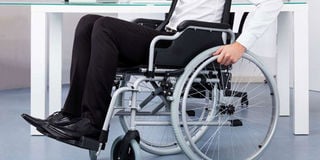Life with quadriplegia

A man in a wheelchair.
Doctors dream about their patients. They fall asleep thinking of ways to help them, think of the surgical procedures they have planned, walk through the steps in their minds, one by one, until they fall asleep. They dream of good outcomes and have nightmares of things going south during treatment.
On my first day as a medical officer intern in the orthopaedic ward, I went home and dreamt about Jorum. It was an unsettling dream. Instead of thinking of what else could be done to help him recover, I was engrossed in a selfish bargain with God. I prayed that in the event that I found myself in Jorum’s shoes, that God would let me die.
Jorum was a 22-year-old engineering student in the local university. He was a charming, undeniably handsome young man who was the envy of his peers. He had a brilliant mind, a way with the girls, a family that cared for him and friends to boot. He loved sports, music and technology. Girls fought for his attention even when he couldn’t be bothered to date.
Then one fateful Sunday, all that changed. Jorum and his friends spent the afternoon watching motor sports at a sports bar while sharing a bottle of whiskey. One bottle turned into two then three and by the time they were leaving the bar, they were rather tipsy. They piled into a taxi and the driver had to contend with drunken banter through-out the ride.
All Jorum remembers was a loud bang and then nothing. When he came to, he was lying on his back staring at a strange ceiling enveloped in the strangest sensation ever. He had no clue what day it was or where he was.
HORRIBLE ACCIDENT
Over the next few days, Jorum came to learn that his life as he knew it, was officially over. He had been in a horrible road accident. A drunken driver had ploughed through a red light and hit their taxi. The gruesome accident resulted in the immediate death of the taxi driver.
One of his friend’s suffered severe head injury that kept him in the intensive care unit for weeks, and the other one had multiple fractures that necessitated repeat surgeries, while Jorum had suffered complete quadriplegia.
The campus heart-throb suffered injury to his spine at the level of the neck. He lost control of everything below the neck. He could not even flick his little pinky finger. In his words, he was a floating head.
I quietly joined the ward round that was already in progress and listened quietly at the back as the residents and the consultant orthopaedic surgeons discussed the patients from bed to bed.
At Jorum’s bedside, everyone went into an uncomfortable silence. The senior-most doctor fumbled with words, trying to gently explain to the young man what his long-term care plan would entail but there was no way of blunting the piercingly brutal finality of the diagnosis. Jorum would never be able to lift a finger in his life.
BEDRIDDEN
Jorum lay there, eerily still, eyes staring at the ceiling, tears rolling out of the corner of his eyes and wetting the bedsheet under his ears. He did not say a word to anyone. He did not acknowledge our presence. The nurse mentioned that he had not spoken a word in the five days he had been in the ward.
In Jorum’s world, he could only move his head from side to side, move his eyes and his tongue. He could not wipe his own tears or scratch an itch on his cheek. He had no idea when he had a bowel movement or when his bladder decided to let loose its contents. He was confined to his bed, with a catheter to keep him dry and adult diapers to contain his stool.
He could dream of what life would have been like but he could never take even a single step in that direction. His mind was lucid and in overdrive, compensating for what else he couldn’t do. I couldn’t imagine what he was going through. He was in prison for the rest of his natural life. Only that this prison was far worse than any correctional facility in the world. He was in prison in his own mind.
Jorum spoke to me for the first time after attending to him for two weeks. He asked me to help him take his own life. He could not believe that God could have such a wicked sense of humour, allow him to lose everything and still deny him the capacity to call it quits on his own terms. I went home and cried.
The next day I called in the psychiatrist to evaluate him and provide solutions for his depression since no amount of counselling was going to pull him out of this one. I have never felt so useless in my career. A patient asked for my help and I ran for the hills, begging God to never ever let me suffer Jorum’s predicament.
DEVASTATING OUTLOOK
Worldwide statistics show that approximately eight per cent of patients like Jorum die within the first 12 months of diagnosis. Their life expectancy is grossly reduced even in the best of settings where they get top-notch care. These statistics may not be a true reflection of our resource-constrained background.
It is devastating to the caregivers to know that there is little they can do to reverse the situation. It is impossible to fathom what the patient goes through mentally and psychologically. These very trying situations humble us all and remind us mortals that we are all equal!



